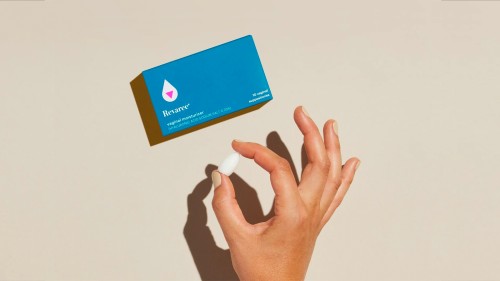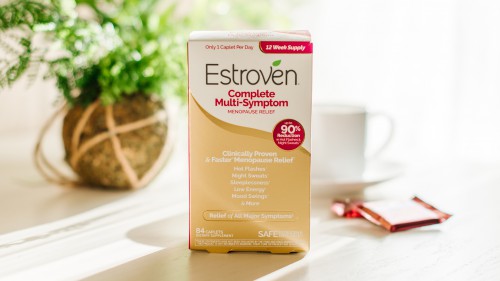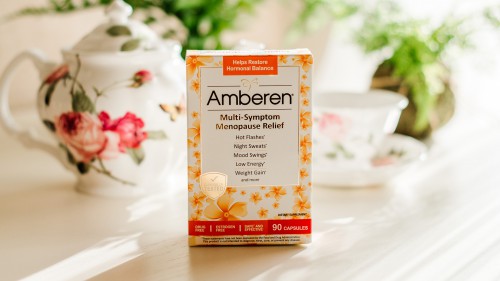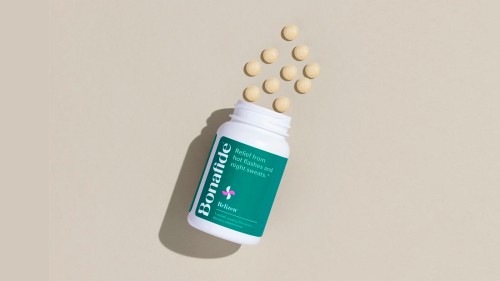6 Supplements and Vitamins to Help with Vaginal Dryness
Published on June 21, 2021
Medically Reviewed by Anthony Dugarte, MD
Vaginal dryness is a common condition that can affect a woman’s quality of life. Luckily, there are many supplements for vaginal dryness to increase female lubrication.

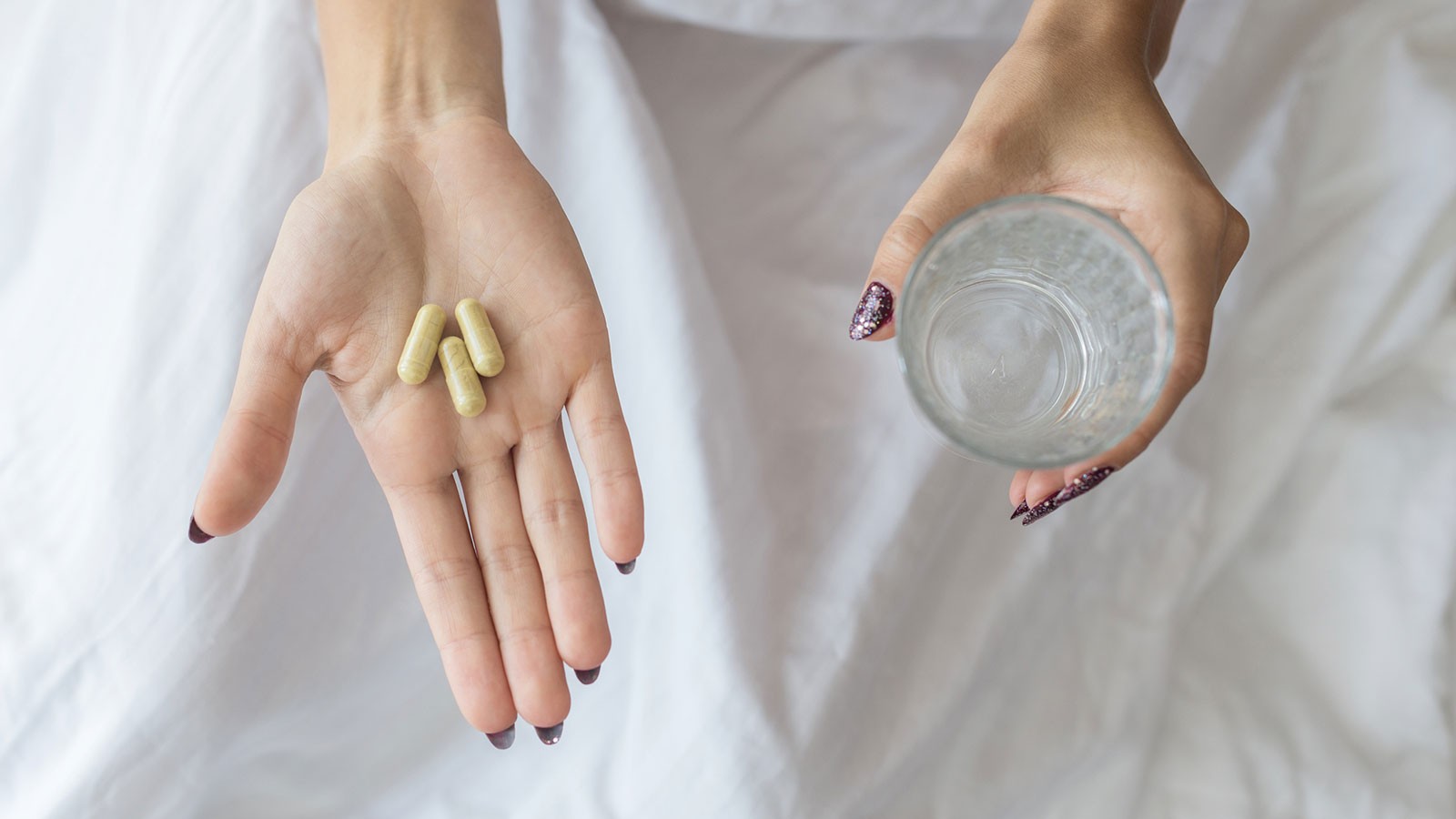
Vaginal dryness can be embarrassing for women to broach with a healthcare practitioner; therefore, many women suffer needlessly.
Meanwhile, without early treatment, the condition may persist.
While it is always best to speak to your doctor about medical concerns, many things can be done naturally to help improve lubrication.
Causes of Vaginal Dryness
Vaginal dryness, also known as atrophic vaginitis, can occur in various degrees to all women as they age.
Natural female lubrication is mainly driven by the hormone estrogen. Estrogen plays an important role in both vaginal and sexual health.
While estrogen levels decline as women age, vaginal tissue can become dry, thin, and fragile, making sex uncomfortable.
Women of all ages may experience vaginal dryness; however, it is more common in those who are menopausal.
Other causes of vaginal dryness may include:
- Hormone fluctuations related to menstrual cycles, childbirth, and breast-feeding
- Cancer treatment including chemotherapy, radiation, and hormone therapy
- Surgical removal of the ovaries
- Hormonal contraceptives
- Certain autoimmune disorders like Sjogren’s Syndrome
- Dietary imbalances
- Dehydration
- Excessive stress
- Depression
Many of these conditions can be signs of other underlying problems. Always speak to your doctor for the best options for you.
Symptoms of Vaginal Dryness
The symptoms of vaginal dryness can vary, and a woman will not necessarily experience all of them at the same time.
Symptoms include:
- Vaginal dryness, stinging, burning, or itchiness
- Loss of libido/interest in sex
- Pain during intercourse
- Decreased lubrication during intercourse
- Light bleeding after intercourse
- Frequent urinary tract infections (UTIs)
Supplements and Vitamins for Vaginal Dryness
While vaginal dryness can be treated by using hormone therapy, a safer option for many women may be the use of supplements to increase female lubrication.
Vitamin E
Vitamin E is a fat-soluble antioxidant that plays an important role in immune functioning and cardiovascular health.
There is some encouraging research suggesting that vitamin E may also be a beneficial supplement for vaginal dryness.
One small 2016 study examined the effects of vitamin E suppositories on vaginal dryness in 52 postmenopausal women. (1)
The study found that vitamin E vaginal suppositories helped the majority of participants with symptoms of vaginal atrophy, including dryness.
Another 2019 study looked at the effect of vitamin D and E vaginal suppositories on vaginal atrophy and vaginal dryness in women with breast cancer receiving tamoxifen. (2)
Researchers found that both vitamin D and E vaginal suppositories were beneficial in improving vaginal atrophy, including dryness in women with breast cancer.
This is encouraging research for women with cancer who cannot use hormone therapy to treat vaginal dryness symptoms.
Both vitamin D and vitamin E suppositories can be used as a safer, alternative therapy to improve symptoms of vaginal dryness.
When taken at an appropriate dose, vitamin E supplements are considered safe for most people.
Summary
Vitamin E can be safely used to help the symptoms of vaginal dryness either as a suppository or an oral supplement. Speak to your doctor about the best option for you.
Vitamin D
Vitamin D is a fat-soluble vitamin needed for strong bones, muscle execution, and immune functioning.
Vitamin D may be another supplement to consider to increase female lubrication.
One 2015 clinical trial evaluated the effects of vitamin D vaginal suppositories on vaginal atrophy, including vaginal dryness. (3)
Forty-four women were divided into two equal groups, the treatment and control groups, which received either a vitamin D or a placebo vaginal suppository daily for 8 weeks.
Researchers found that vitamin D vaginal suppositories had protective effects that decreased pain during intercourse, improved vaginal pH, and reduced dryness compared to the placebo suppositories.
A 2019 systematic review examined six studies, two of which showed that vitamin D supplementation improved the growth of vaginal epithelial cells, improved vaginal pH, and decreased vaginal dryness in menopausal women. (4)
A dosage of 600 IU or less of vitamin D does not pose any significant safety concerns. Speak to your doctor to determine the dose that is right for you.
Summary
Vitamin D may improve the vaginal health of women, particularly during menopause.
Related: Best Vitamin D Supplements, According to a Dietitian
Probiotics
Probiotics have long been touted for their impact on gut health; however, some research suggests that probiotics may also improve the vaginal “ecosystem.”
One study found that the culprit causing vaginal dryness isn’t simply low estrogen levels but that the low estrogen limits the growth of probiotic bacteria in the vagina. (5)
This can lead to vaginal dryness, atrophy, and the potential for vaginal infections.
Researchers believe that oral probiotic use may support the vaginal ‘ecosystem’ by preventing a decrease in the protective vaginal flora that may cause dryness and irritation.
Another 2014 study found that probiotics may help relieve the symptoms of vaginal atrophy, including vaginal dryness, but researchers pointed out that further research is needed to confirm this link. (6)
Probiotics can cause some digestive upset, like gas, bloating, or diarrhea. Speak to your doctor about which probiotic might be best for you.
If you’re interested in improving your vaginal “ecosystem,” you may want to consider including probiotic-rich foods in your diet.
These include yogurt, kefir, sauerkraut, kombucha, kimchi, and tempeh.
Summary
Probiotics can help increase healthy bacteria in the vagina, improving dryness.
Omega-3 Fatty Acids
Omega-3 fatty acids are essential fatty acids that play a role in hormone production and provide various health benefits.
Omega-3s may also help with vaginal dryness by increasing female lubrication.
One 2012 study found that taking omega-3 supplements significantly reduced the symptoms of atrophic vaginitis (thinning, drying, and inflammation of the vaginal walls) in postmenopausal breast cancer survivors. (7)
In a more recent 2019 study, researchers found that higher intakes of dietary EPA and DHA, two types of omega-3 fatty acids, helped relieve menopause symptoms, including vaginal dryness, itching, and discomfort. (8)
Omega-3 fatty acids are considered a safe supplement for most people at dosages below 3000 mg.
Rich food sources of omega 3s include salmon, mackerel, oysters, flaxseeds, and walnuts.
Summary
Omega-3 fatty acids can help increase lubrication in the vagina and decrease inflammation.
Related: Best Fish Oil Supplements
Hyaluronic Acid
Hyaluronic acid is a clear, sticky compound naturally produced by the body.
The main function of hyaluronic acid is to retain water to ensure your skin and surrounding tissues are moist and well lubricated.
One 2016 study compared the effectiveness of a hyaluronic acid vaginal cream versus conjugated estrogen (medication containing a mixture of estrogen) for the treatment of vaginal atrophy. (9)
The study found that both hyaluronic acid and conjugated estrogen can improve the symptoms of vaginal atrophy.
However, hyaluronic acid was more effective and is a better treatment option for women who do not want to or cannot receive hormone therapy.
A 2021 systematic review of the literature also found that hyaluronic acid has efficacy similar to vaginal estrogens for the treatment of vaginal atrophy. (10)
Researchers suggested that the use of hyaluronic acid is an attractive alternative for women who cannot or choose not to use hormonal treatment.
Hyaluronic acid is safe for most people, except those who are allergic to it. Always speak to your doctor before taking any supplements.
Summary
Hyaluronic acid can help increase moisture in the vaginal area, increasing lubrication.
Kudzu
Kudzu is an herb used in Chinese medicine to treat a variety of ailments.
Some research suggests that taking kudzu orally can reduce menopause symptoms, including vaginal dryness.
One older study found that taking kudzu daily helped reduce vaginal dryness and restore the health of vaginal tissue. (11)
However, according to a 2015 systematic review, the evidence regarding the benefits of using various species of kudzu for reducing vaginal dryness is unclear. (12)
When taken at normal doses, kudzu appears to be safe. But there are some reports of harmful liver changes and anemia that may occur. Speak to your doctor about what is best for you. (13)
Summary
Kudzu may help relieve certain symptoms of menopause, like vaginal dryness, but more research is needed at this time.
How to Increase Female Lubrication Naturally
Taking supplements to increase female lubrication may not be for everyone. Thankfully there are ways to increase female lubrication naturally:
- Stay sexually active with a partner or with yourself. Any sexual activity can increase blood flow to the vagina, which can keep the tissue surrounding your genitals healthy.
- Move your body. Exercise in any form can help maintain hormone balance.
- Stay hydrated. Drinking plenty of water can help support moisture throughout your body.
- Try using water-based lubricants. These lubricants may help to alleviate discomfort during intercourse.
- Participate in stress-reducing activities. Stress and anxiety can contribute to vaginal dryness. Try meditation or yoga to reduce your stress levels.
There are also foods you can eat to enhance your vaginal health from the inside out. Some nutritional tips include:
- Add probiotic-rich foods into your daily diet. Start your day with some yogurt or kefir to help feed your vaginal flora.
- Increase your intake of leafy greens. Leafy greens can enhance your circulation, including the blood flow to the vagina.
- Add avocados to your diet. Avocados provide a rich source of unsaturated fats, which can enhance estrogen levels and strengthen your vaginal walls.
- Increase your fatty acid intake by including fatty fish (salmon, mackerel, and tuna), sunflower seeds, and sesame seeds into your diet. A diet high in fatty acids may help to increase vaginal lubrication.
The Bottom Line
Estrogen therapy is often the first line of defense against vaginal dryness and other symptoms of menopause.
However, for many women, using estrogen therapy to reduce the symptoms of menopause carries risks, particularly for women with a history of cancer.
The research on supplements for vaginal dryness is encouraging. The studies linking the use of vitamin E and vitamin D vaginal suppositories and hyaluronic acid vaginal cream for female lubrication are strong.
The evidence on the benefits of taking probiotics, omega 3 fatty acids, or kudzu to alleviate vaginal dryness is more limited. More research would need to be done before I would recommend taking those supplements for vaginal dryness.
However, before taking any supplement to manage the symptoms of menopause, it is important to speak with your healthcare provider first. High doses of certain supplements may be dangerous for you and your long-term health.
At WellnessVerge, we only use reputable sources, including peer-reviewed medical journals and well-respected academic institutions.
- A survey of the therapeutic effects of Vitamin E suppo:
https://www.ncbi.nlm.nih.gov/pmc/articles/PMC5114791/ - The effect of vitamin D and E vaginal suppositories on tamoxifen-induced vaginal atrophy in women with breast cancer:
http://website60s.com/upload/files/supportive-care-in-cancer-v27-iss4-a21.pdf - The effect of vitamin D on vaginal atrophy in postmenopausal women:
https://www.ncbi.nlm.nih.gov/pmc/articles/PMC4387645/ - Effect of Vitamin D on the Vaginal Health of Menopausal Women: A Systematic Review:
https://www.ncbi.nlm.nih.gov/pmc/articles/PMC6952708/#:~:text=Of%2520six%2520examined%2520studies%252C%2520two,vaginal%2520dryness%2520in%2520menopausal%2520women. - Vaginal Microbiome and Epithelial Gene Array in Post-Menopausal Women with Moderate to Severe Dryness:
https://www.researchgate.net/publication/51786637_Vaginal_Microbiome_and_Epithelial_Gene_Array_in_Post-Menopausal_Women_with_Moderate_to_Severe_Dryness - Association between the vaginal microbiota, menopause status and signs of vulvovaginal atrophy:
https://www.ncbi.nlm.nih.gov/pmc/articles/PMC3994184/ - The Effect of Omega 3 Fatty Acids on Atrophic Vaginitis in Breast Cancer Survivors:
https://kb.osu.edu/handle/1811/51959 - Higher intake of dietary n-3 PUFA and lower MUFA are associated with fewer menopausal symptoms:
https://www.tandfonline.com/doi/full/10.1080/13697137.2018.1547700 - Comparison of the Hyaluronic Acid Vaginal Cream and Conjugated Estrogen Used in Treatment of Vaginal Atrophy of Menopause Women: A Randomized Controlled Clinical Trial.:
https://www.ncbi.nlm.nih.gov/pmc/articles/PMC4709811/ - Hyaluronic Acid in Postmenopause Vaginal Atrophy: A Systematic Review:
https://pubmed.ncbi.nlm.nih.gov/33293236/ - Effect of Pueraria mirifica on vaginal health:
https://pubmed.ncbi.nlm.nih.gov/17415017/ - An evidence-based systematic review of kudzu (Pueraria lobata) by the Natural Standard Research Collaboration:
https://pubmed.ncbi.nlm.nih.gov/24848872/ - Efficacy and safety of Pueraria mirifica (Kwao Kruea Khao) for the treatment of vasomotor symptoms in perimenopausal women: Phase II Study:
https://pubmed.ncbi.nlm.nih.gov/14971532/


